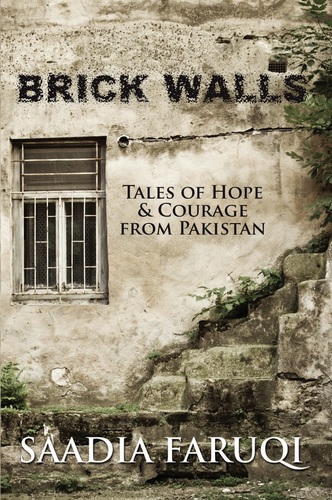In Brick Walls: Tales of Hope & Courage from Pakistan, Saadia Faruqi brings us seven short stories with heartbreaking verisimilitude of life in modern Pakistan. It is both a love letter to her home country and a stark, critical look at its current challenges. As Saadia puts it, "Little is known about Pakistan’s rich culture or colorful daily life. Nobody seems to know or care to discuss the strides being taken in education, social services, and even politics that are improving the nation every year...It is also a nation full of kind-hearted individuals struggling to make their society better with optimism and resolve. That’s the Pakistan I want people to know about."
| I like that Saadia takes risks. She offers an eye-opening perspective of a young man recruited to become a suicide bomber; a vivacious girl determined to play the male-dominated sport of cricket; and a revolutionary musician who performs to spite the Taliban. Every viewpoint this book puts forth is fresh, different, and worth knowing. Saadia's most compelling writing technique is her knack for suspense. She has this way of slipping in little hints - a detail that you might overlook or think nothing of - then wrapping everything back full circle. There were times I gasped, "No!" as I realized the foreshadowing from three pages ago had come back, and something terrible was about to happen. She pulls you in consciously and meticulously - with every detail, she gets you to love or sympathize with her characters and feel invested in their futures, fragile as they are. If I have one wish for this book, it's that I want it to show more than explain, especially when it comes to the deep emotions each protagonist experiences. Saadia sets up each story with so much excellent tension, and I want to see the characters react instead of being told how they feel - then again, I'm an analytical reader and prefer to read between the lines, which isn't the case for all readers. Style preferences aside, there is much depth here to dissect. |
Another hard-hitting concept from Brick Walls is the presence of privilege through money, class, politics, and gender. Saadia is subtle yet deliberate in her portrayal. In "Tonight's the Night," we learn about a musician who is hired to play in the homes of the upper class, who "could circumvent Peshawar's strict norms and have parties in their secure homes." Details like these stuck with me. My favorite story, "Bittersweet Mangoes," tells of a boldly curious young woman who steps away from her privilege to learn about the true woes of her country. Like many of Saadia's characters, I came to look at her with admiration and appreciation.
This is Saadia's first work of fiction, but she writes regularly for a number of nonfiction publications including State of Formation, The Islamic Monthly, and Tikkun Daily. She is also the editor of the Interfaith Houston blog and Blue Minaret literary magazine. You can learn more about Saadia's work at www.saadiafaruqi.com.
As an American reader, I was grateful for the opportunity to explore these perspectives and learn more about a place that US news typically doesn't empathize with. Yet it's critical to acknowledge how many of our problems, hopes, dreams, loves, and passions parallel each other. That is the importance of world literature and this book: to let us hear these voices and feel their existence, no matter what physical distance separates us. Beyond the political critiques, Saadia hits on something even more important and memorable, at least for me: the shared beauty and common kindness of humanity.

 RSS Feed
RSS Feed